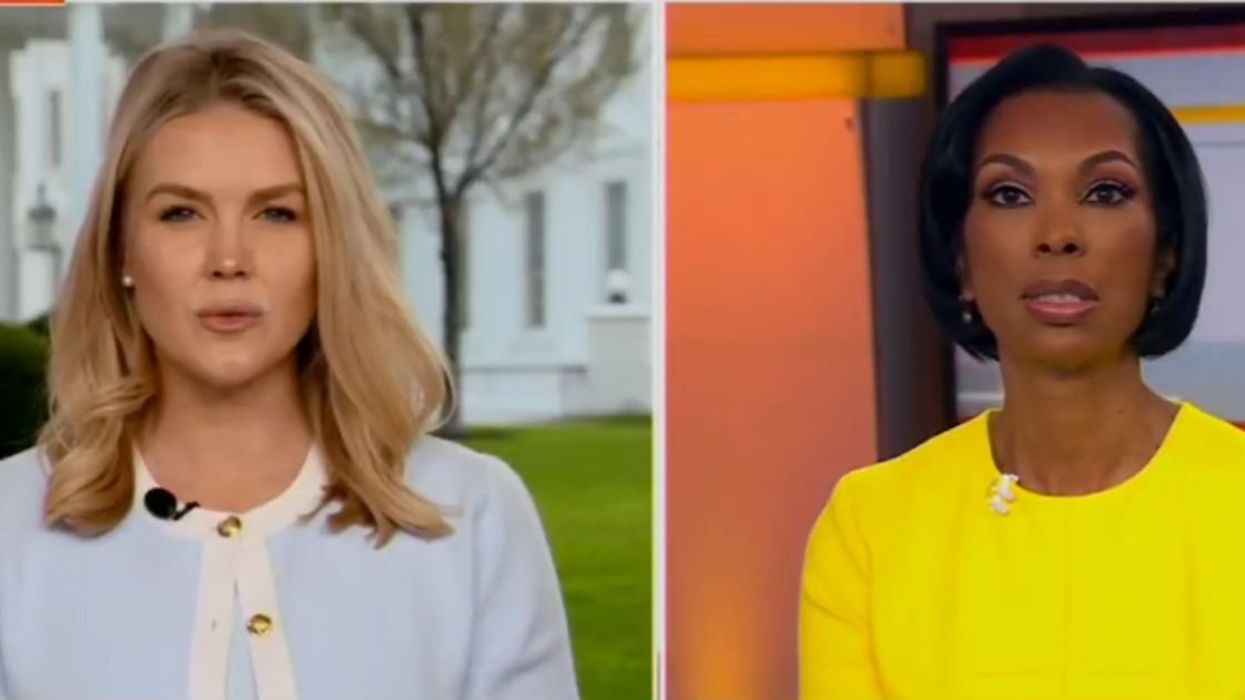Former President Donald Trump was criticized for downplaying climate change and rising sea levels during a recent interview on Fox News wherein he claimed that rising seas just means there will be "more beachfront property."
Speaking on Fox and Friends, Trump—who has a long history of climate denial—dismissed concerns about climate change and made the following blatantly false statement:
"Nuclear weapons are the biggest threat, not global warming. When they say that the seas will rise over the next 400 years, one-eighth of an inch, you know, which means basically have a little more beachfront property, okay?"
He proceeded to mock President Joe Biden, scrunching up his face as he spoke in a weak attempt to mimic the president's cadence:
"Think of it: The seas are going to rise. Who knows? I watched [President Joe] Biden the other night. 'It's the greatest existential threat.'"
"He loves that word because it's a big word and he doesn't even know what the hell the word means. 'It's the greatest existential threat to our country, global warming.'"
The official Biden-Harris campaign account later highlighted Trump's words in a post on X, formerly Twitter, noting that Trump's remark about beachfront property "says he supports climate change and rising sea levels."
You can hear what Trump said in the video below.
Trump is of course wildly incorrect.
Estimates from the National Ocean Service suggest that sea levels along the U.S. coastline are poised to increase by 10 to 12 inches in the next thirty years, mirroring the rise observed over the past century.
This uptick is expected to amplify the severity of storm surges, flooding, and coastal damage, potentially displacing both wildlife and communities, as noted by National Geographic. Studies indicate that as many as 13 million American homes could face repercussions from rising sea levels by the year 2100.
However, currently, the allure of waterfront vistas seems to be outweighing concerns about property values.
Indeed, coastal properties in the United States have experienced more rapid appreciation compared to inland properties. Moreover, these coastal properties are increasingly being acquired by wealthier individuals, according to findings published in March in the scientific journal Nature Communications.
The projection for a substantial increase in sea levels along the American coastline indicates a looming threat for the 40 percent of the population residing in these vulnerable areas, heightening the risk of flooding.
The escalating danger of coastal flooding and erosion has prompted insurance companies to retreat from coastal regions, particularly evident in states like Florida, where several major insurers have exited the market, leading to soaring premiums for consumers.
And who wants to tell him that rising sea levels actually mean less beachfront property, not more, as land increasingly sinks beneath the water?
Trump was swiftly mocked for his inane hot take.
Trump has mocked the science behind climate change many times.
In a tweet issued in January 2017, he claimed the East Coast "could use a little bit of that good old Global Warming" as it contended with record-breaking frigid temperatures.
Trump has often placed himself at odds with the scientific community; a noted climate change denier, he has claimed that global warming is a hoax perpetrated by the Chinese.
During his presidency, he became the subject of intense backlash after announcing he would withdraw the United States from the Paris Agreement on climate.
Trump’s decision to exit from the agreement, which aimed to reduce greenhouse gases and stem the effects of climate change, has drawn international condemnation from world leaders and environmentalists alike who predict it could damage U.S. international standing on environmental concerns.
The Trump administration also came under fire in 2019 following an announcement that it would assemble an ad hoc working group of climate skeptic scientists to reassess the government's analysis of climate science and the effect of fossil fuels on the planet.








 @bottleneckloser/Instagram
@bottleneckloser/Instagram @bottleneckloser/Instagram
@bottleneckloser/Instagram @bottleneckloser/Instagram
@bottleneckloser/Instagram @bottleneckloser/Instagram
@bottleneckloser/Instagram @bottleneckloser/Instagram
@bottleneckloser/Instagram @bottleneckloser/Instagram
@bottleneckloser/Instagram @bottleneckloser/Instagram
@bottleneckloser/Instagram @bottleneckloser/Instagram
@bottleneckloser/Instagram @bottleneckloser/Instagram
@bottleneckloser/Instagram @bottleneckloser/Instagram
@bottleneckloser/Instagram @bottleneckloser/Instagram
@bottleneckloser/Instagram





 @ElleGray/Mastodon
@ElleGray/Mastodon rEnoughMuskSpam/Reddit
rEnoughMuskSpam/Reddit rEnoughMuskSpam/Reddit
rEnoughMuskSpam/Reddit rEnoughMuskSpam/Reddit
rEnoughMuskSpam/Reddit rEnoughMuskSpam/Reddit
rEnoughMuskSpam/Reddit rEnoughMuskSpam/Reddit
rEnoughMuskSpam/Reddit @Angelica_Reed1/X
@Angelica_Reed1/X
 @fred_guttenberg/X
@fred_guttenberg/X @MAGALieDetector/X
@MAGALieDetector/X

 @realDonaldTrump/Truth Social
@realDonaldTrump/Truth Social